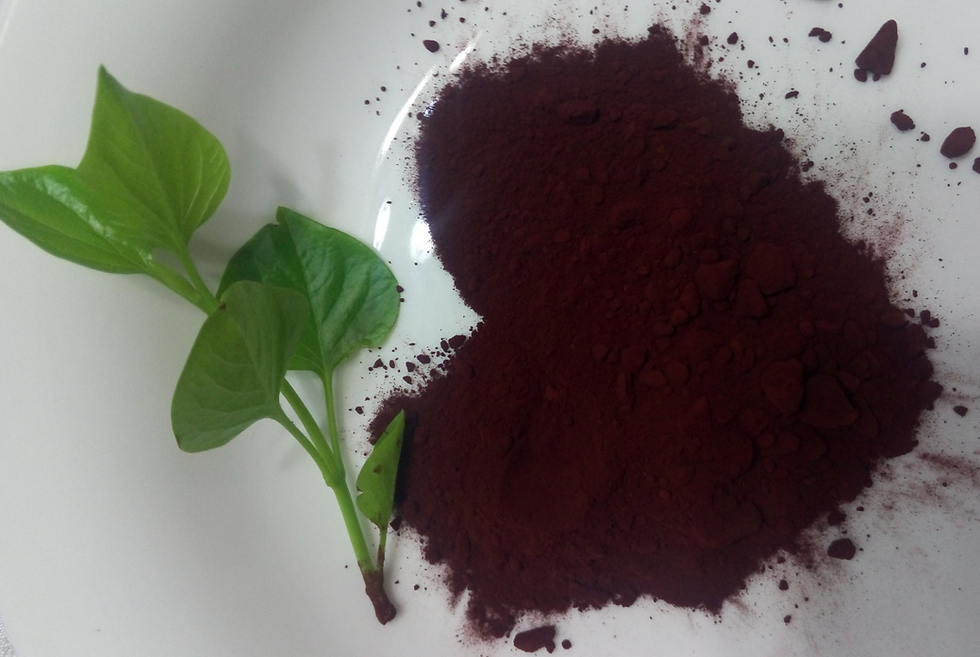Natural Astaxanthin Benefits for Antioxidant
- A Clover Nutrition Inc

- 2024年12月10日
- 讀畢需時 3 分鐘
A Clover Nutrition Inc is a One Stop Solution for natural astaxanthin oil, which could also offer custom formulation, Encapsulation, and Granulating. You can best support and directly supply from Natural Astaxanthin China factory.
Chemical formula: C40H52O4
CAS Number: 472-61-7
HS code: 1302.1900
Packaging size: 1kg or 5kg aluminum bag/bottle in carton
Inquiry: info@clovercn.com sales@clovernutrition.com

Natural Astaxanthin is a powerful antioxidant from Haematococcus pluvialis. Natural astaxanthin raw materials is used for cosmetic and nutritional supplement.
Astaxanthin is a member of the dietary carotenoids group which is widely recognized as one of the most effective and powerful natural antioxidants. Besides, in addition to antioxidant properties, is used as a fat-soluble pigment, which has a deep red color.
Product Description:
Natural Astaxanthin Powder is a red or dark red color with a slight algal smell. The botanical source is microalgae Haematococcus pluvialis. Natural Astaxanthin Oleoresin has a red or dark red color and is an oil-based liquid with a slight algal smell. Astaxanthin Oleoresin is extracted from cells of toxic-free microalgae Haematococcus pluvialis.
Specification:
Natural Astaxanthin Powder2.0%HPLC
Natural Astaxanthin Powder 2.5%HPLC
Natural Astaxanthin Powder 3.0%HPLC
Natural Astaxanthin Powder 5.0% HPLC
Natural Astaxanthin Oil 5.0% HPLC

Company Name | A Clover Nutrition Inc |
Address: | No. 58 Keji 3rd Road , Hi-Tech Zone, Xi'an, Shaanxi, China 710075 |
E-mail: |
Astaxanthin, also known as astaxanthin or astaxanthin, is a natural carotenoid pigment commonly found in certain Marine organisms such as algae, salmon, shrimp, and crabs. It acts as a powerful antioxidant with multiple potential benefits in terms of human health:
Antioxidant Astaxanthin Benefits
Astaxanthin can assist in resisting the damage inflicted by free radicals on human cells, which might contribute to decelerating the aging process and exert a positive influence on the prevention of chronic diseases such as cardiovascular disease. Its antioxidant effect is primarily manifested in the following aspects:
1. Neutralization of free radicals
Astaxanthin proficiently neutralizes the free radicals within the body. Free radicals are highly reactive molecules possessing unpaired electrons that can assail cell membranes, proteins, and DNA, giving rise to oxidative stress and cellular damage. Astaxanthin stabilizes free radicals by furnishing electrons, thereby minimizing their detrimental impact on cells.

2. Protection of cell membranes
Astaxanthin is fat-soluble and can be incorporated into the lipid bilayer of cell membranes. This characteristic enables it to play an antioxidant role within the cell membrane, averting lipid peroxidation and safeguarding the integrity and functionality of the cell membrane.

3. Enhancement of the effects of other antioxidants
Not only does astaxanthin possess a robust antioxidant capacity independently, but it also collaborates synergistically with other antioxidants (such as vitamin C and vitamin E) to amplify the overall antioxidant effect. This synergistic action can protect cells from oxidative stress more comprehensively.
4. Anti-inflammatory effect
Oxidative stress is frequently accompanied by an inflammatory response. Astaxanthin mitigates inflammation by suppressing the production of inflammatory mediators (such as prostaglandins, interleukins, etc.), and further reduces the damage of oxidative stress to tissues.
5. Protection of mitochondria
Mitochondria are the energy factories of cells and the principal sites of free radical generation. Astaxanthin can enter the mitochondria, shield them from oxidative impairment, and sustain normal energy metabolism and cellular function.

6. Prevention of chronic diseases
Due to its potent antioxidant potency, astaxanthin is believed to be conducive to preventing a variety of chronic diseases associated with oxidative stress, encompassing cardiovascular disease, diabetes, neurodegenerative diseases such as Alzheimer’s disease, and certain types of cancer.
7. Protection of skin and eyes
The antioxidant effect of astaxanthin is also exhibited in the protection of the skin and eyes. It can diminish skin damage induced by ultraviolet light, retard the skin aging process, and safeguard the retina from oxidative stress damage, aiding in the prevention of eye disorders such as macular degeneration.
Although astaxanthin demonstrates numerous potential health benefits, it is crucial to note that the majority of research is still in the laboratory and animal testing phases, and more clinical trials are requisite to confirm the specific effects in humans. When utilizing astaxanthin supplements or related products, it is advisable to consult a physician or nutrition expert to ensure safety and suitability.



















留言